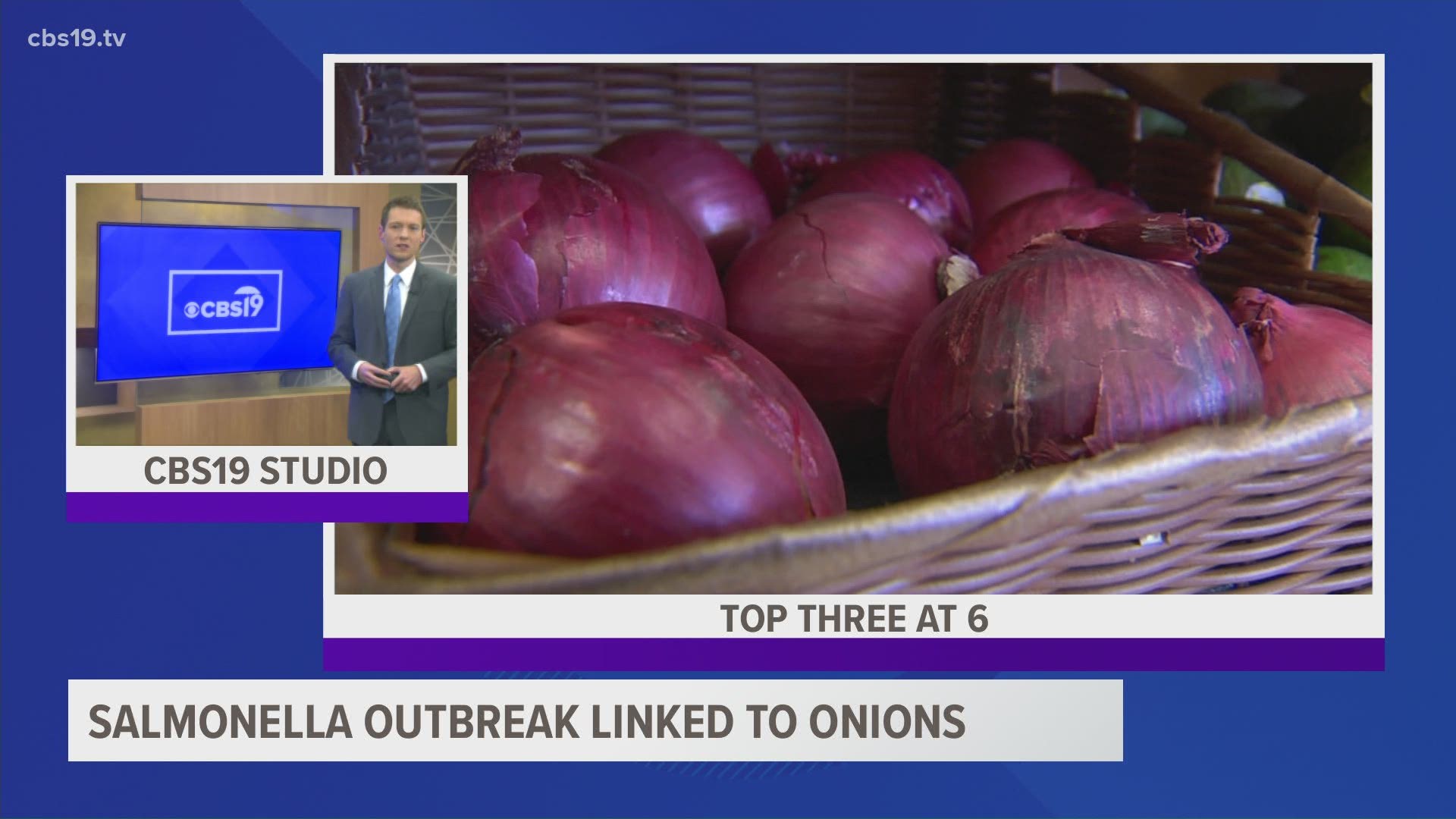TYLER, Texas — An onion supplier, multiple stores and a variety of products are part of a nationwide onion recall linked to a Salmonella Newport outbreak.
As of Wednesday, September 2, more than 1,000 people have fallen ill due to contaminated onions. Two of those cases have come from Texas.Currently, 136 hospitalizations have been reported across the U.S. with no deaths.
The Federal Drug Administration (FDA), Centers for Disease Control and Prevention (CDC), state and local partners are investigating the multi-state outbreak. The FDA’s traceback investigation is ongoing but has identified Thomson International, Inc. of Bakersfield, California, as a likely source of potentially contaminated onions. Information showed red onions are a likely source of this outbreak. However, due to the way onions are grown and harvested, other onion types, such as white, yellow or sweet yellow are also likely to be contaminated.
According to the Centers for Disease Control and Prevention (CDC), the following suppliers and stores are subject to the recall:
- Thomson International, Inc. – Red, white, yellow and sweet yellow onions
- Food Lion - Red, white and yellow onions
- Giant Eagle - Red, white and yellow onions
- Hello Fresh - All onions
- Kroger - Red, white, yellow, yellow Vidalia and sweet yellow onions
- Publix Super Market - Red onions
- Ralph's - Yellow onions
- Trader Joe's - Red onions
- Walmart - Red, white, yellow and sweet yellow onions
There are also recalled food items that contain the recalled onions:
- Amana Meat Shop and Smokehouse - Jarred diced ham
- Fred Meyer - Cheese dips/spreads
- Fry's Food Stores - Cheese dips/spreads
- Giant Eagle - Prepared foods like chicken salads, salads, subs, pizzas and variety of other foods
- Kroger - Macaroni and pasta salad, chicken salad sandwich
- Kroger - Cheese dips/spreads
- Kroger Delta - Cheese dips/spreads
- Kroger Mid-Atlantic - Cheese dips/spreads
- Smith's - Cheese dips/spreads
- Spokane Produce - Salsa/salsa verde
- Walmart - Diced yellow onions, diced mirepoix, fajitas stir fry trays and chicken salad sandwiches
- Taylor Farms - Prepared foods like breakfast scramble bowls and snack trays
Check your home for onions and other foods recalled by the companies mentioned above. Do not eat, serve or sell recalled onions supplied by Thomson International, Inc. or any foods made with recalled onions.
If you can’t tell where your onions are from, don’t eat them or any food made with them. Throw them away.
If you used recalled onions to make any other food, don’t eat the food. Throw it away, even if some of it was eaten and no one got sick.
Wash and sanitize any surfaces that may have come in contact with onions or their packaging, such as countertops, storage bins, refrigerator drawers, knives, and cutting boards.
When you order food from a restaurant or shop for food, check to make sure they are not serving or selling any recalled onions, foods prepared with recalled onions, or any recalled foods such as salads, sandwiches, tacos, salsas and dips. If they don’t know where their onions are from, don’t buy the product or order the food.
SYMPTOMS OF A SALMONELLA INFECTION
Most people infected with Salmonella develop diarrhea, fever and stomach cramps six hours to six days after being exposed to the bacteria. The illness usually lasts four to seven days, and most people recover without treatment.
For some people, the illness may be so severe that the patient needs to be hospitalized. Salmonella infections may spread from the intestines to the bloodstream and then to other places in the body.
Children younger than 5, adults 65 and older and people with weakened immune systems are more likely to have a severe illness.
Take these steps if you have symptoms of a Salmonella infection:
- Talk to your healthcare provider.
- Write down what you ate in the week before you started to get sick.
- Report your illness to your local health department. The health department will likely call you for an interview to ask you about foods you ate in the week before you got sick.
- Assist public health investigators by answering their questions when they contact you.

